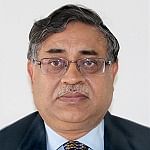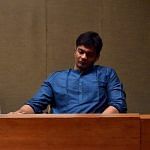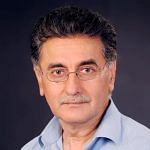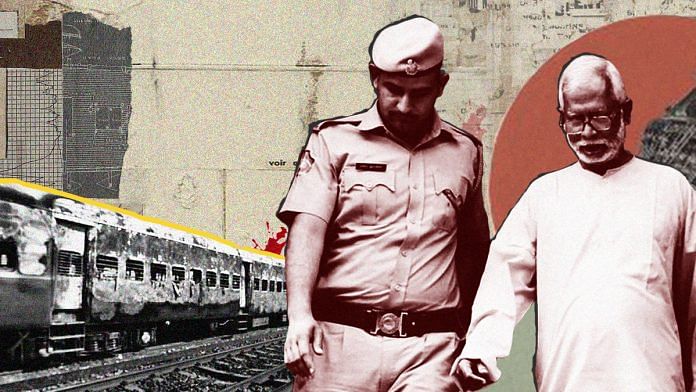In the judgement acquitting Aseemanand and three others in the Samjhauta Express blast case, NIA special court judge Jagdeep Singh has criticised the prosecution, saying ‘an act of terrorism’ will go unpunished for want of evidence.
ThePrint asks: NIA judge on Samjhauta prosecution: Does evidence cover-up hurt India’s war on terror?
From CBI to NIA, all of them collectively messed up the Samjhauta blast investigation
 N.R. Wasan
N.R. Wasan
Former special director general, NIA
The NIA officers involved in the investigation of the Samjhauta express blast case are responsible for the poor job they have done. This is quite evidently hurting India’s fight against terror, and we have to fix accountability — either on the officers for poor investigation or for the poor prosecution. Anyone found guilty must be punished.
The CBI, too, is responsible to a certain extent because it had first investigated the case. All of them collectively messed up the investigation. Meanwhile, politicians are blaming each other and trying to fool the public.
I had joined the National Investigation Agency after the charge-sheet in the Samjhauta case had been filed, and I was certain there won’t be any conviction. There were two reasons for this.
One, when the NIA was handed over the case in July 2010, considerable amount of time had passed since the blast in February 2007. So, there was no way the NIA could have collected evidence even if they wanted to because most of the evidence had already vanished by then.
Second, the NIA didn’t diligently investigate whatever evidence that was left. If it were up to me, I wouldn’t even have filed the charge sheet, because the evidence was highly inadequate.
For any case to end in conviction, scientific evidence is key because witnesses are bound to turn hostile. In Bodh Gaya bombing case, for instance, we had heavily relied on scientific evidence to secure conviction.
After Congress’s ‘Hindu terror bogey’ fell flat in court, a section of media affiliated to the party is crying foul
 Raghav Awasthy
Raghav Awasthy
Lawyer & RSS member
The NIA court’s judgment in the Samjhauta Express blast case has to be read in its totality. If Judge Jagdeep Singh indeed felt there was some cover-up, then it would not have been difficult for him (under the relevant provisions of the CrPC) to unearth the evidence of his own accord. Sometimes, what is termed as ‘best evidence’ is not admissible in a court of law for one reason or the other.
Certain sections of the media have been irresponsible in cherry-picking lines from the judgment. The “Hindu terror bogey” had been raised at a much later stage of the investigation by the UPA government of the day. Now that the same has fallen flat in the court, a section of the media affiliated to the Congress ecosystem is crying foul. It is the election season, after all, and it is about time that the Congress party clarifies as to what it feels about the “Hindu terror” now.
Finally, it has to be noted that there is no single statutory definition of the phrase ‘best evidence’ under the Indian Evidence Act of 1872. What is ‘best evidence’ in the opinion of the prosecuting agency would differ from one case to the other. It would be better if people who do not have even a passing acquaintance with the facts of the case or the law regarding evidence refrain from making any comments as that would indeed weaken India’s case against terrorism emanating from Pakistan.
The evident bias in Samjhauta case undermines India’s capacities to deal with all terrorism
 Ajai Sahni
Ajai Sahni
Executive director, Institute for Conflict Management
India’s ‘premier counter-terrorism investigation agency’, the National Investigation Agency has once again disgraced itself in the Samjhauta Express bombing case, as, indeed, it has in preceding cases of what has been described as Hindutva terrorism.
This time around, the NIA court judge, Jagdeep Singh, has been scathing in his criticism, observing that the “best evidence” was withheld by the prosecution, and the independent witnesses that had been cited initially were never examined.
The consequent and inevitable erosion of the NIA’s credibility and the evident bias in this case will create mistrust that will undermine India’s capacities to secure both domestic and international cooperation in future cases of terrorism.
We have, for decades now, been telling Pakistan that there are no ‘good terrorists’ and ‘bad terrorists’; that if you create an environment where some are tolerated, others will also flourish. But this, precisely, is what the present regime in India is doing as well – indulging ‘good’ so-called ‘Hindutva terrorists’ with a political wink and nod, backed by lackadaisical investigative processes by compromised agencies.
Worse, the judgment and public documentation of NIA’s failures can only encourage others of similar ideological orientation and intent to future misadventures, on a presumption of increasing impunity; even as they augment the cycle of hate and retaliation that the pervasive politics of communal polarisation feeds into.
Also read: Samjhauta blast acquittals have turned India’s accusing finger at Pakistan inwards
Samjhauta blast was such that it would have been difficult to gather evidence beyond the confession
 Justice Ranjit Randhawa (retd)
Justice Ranjit Randhawa (retd)
Former judge
The confession of one of the four accused in the Samjhauta Express blast case has not been accepted by the NIA judge, as it was later retracted. In crimes like these, confessions carry immense value and make for an important piece of evidence. But the judge disbelieved the confession, saying it wasn’t voluntary.
The NIA judgement quotes the law correctly that once a confession has been retracted, it needs to be corroborated. The corroboration was missing in this case.
However, given how it was a judicial confession and not an extra-judicial confession, it carries greater weight and, in my opinion, should have been accepted. Judicial confessions should be believed.
I believe that sometimes, evidence that would usually be accepted isn’t because of public perception. That may have happened in this case.
The nature of the crime was such that besides the confession, it must have been difficult to find any other evidence. There may have been circumstantial evidence, but the law regarding circumstantial evidence is also quite strict. Circumstances must also be proven beyond doubt and must point towards the guilt of the accused.
That said, the investigating authorities should have been all the more conscious and careful in collecting all the important evidence on a timely basis.
By Fatima Khan, journalist at ThePrint.




The government has worked over time to hush up the case and avoid punishment to the guilty. It has actively helped NIA to bury significant evidences available to NIA. Perhaps even an appeal will not help to resurrect the case with proper evidenes.
It will certainly hurt – dead in the water, now, actually – India’s efforts to get lawful closure for the 26 / 11 trial.